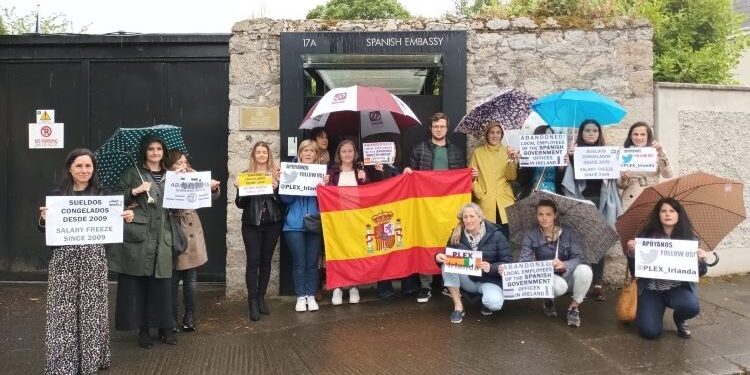The Diplomat
The twenty or so Spanish General State Administration contract workers serving at the Spanish Embassy in Ireland, as well as at the Commercial Office, the Tourist Office and the Instituto Cervantes, have joined the protests of their colleagues from the United Kingdom, the Netherlands and Germany, among others, to demand an “immediate improvement” in their working conditions.
According to the workers themselves, “the Spanish administration has been in breach since 2009 of the 1990 agreement between the unions and the administration whereby the salaries of foreign workers were subject to an annual salary review based on local CPI rises and fluctuations in the country’s currency”. On May 27, the High Court of Justice ratified the sentence that gave reason to the collective, “which is on a war footing against the public administration so that the sentence is complied with,” they added.
In addition to participating in the global initiative Black Mondays in the foreign service, promoted by the trade unions, the Irish foreign labor collective mobilized on June 10 at the gates of the Spanish Embassy in Dublin to denounce the deterioration of their situation due to the “enormous increase in the cost of living in this country”.
With their salaries frozen since 2009, with the only exception of a minimal increase of 1.1% in 2019, the group denounces that they have been suffering a decline in their working conditions and salaries for 13 years. In this time of freeze, Ireland has suffered a CPI increase of 13.1%. In addition, Dublin has become one of the most expensive cities in the world to live in, largely due to the housing crisis. The average price of a rent in Dublin has doubled since 2011, being now €2,065 per month. There is no universal public healthcare in Ireland and there is a lack of quality public services.
Their list of demands also includes an update of labor categories, the establishment of an annual revision of wages in line with the rise in the CPI in Ireland, compensation for the payment of health insurance for workers who do not have access to the Irish medical health card and compensation for not being able to receive national subsidies for public transport.






